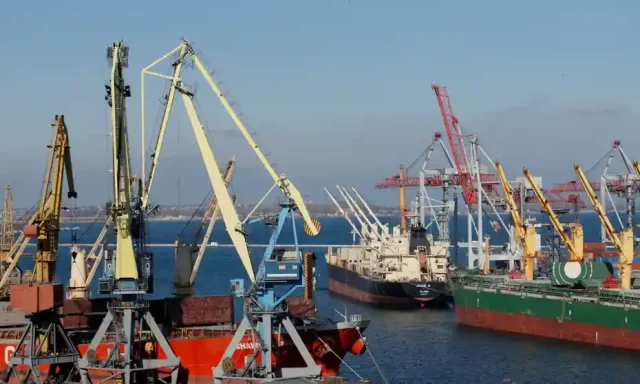
Dealing With the Naval Blockade of Ukraine: A Diversity of Views
Publication: Eurasia Daily Monitor Volume: 19 Issue: 81
By:

The issue of Russia’s naval blockade of Ukrainian ports, which severely hampers the export of Ukrainian agricultural commodities, has for weeks been dominating headlines and high-level discussions at various international forums. Not only is the forcible Russian obstruction of Ukraine’s food exports having a ruinous impact on the latter country’s economy and national security, but it also threatens to unleash famines across the developing world (see EDM, April 20, May 18). As a result, experts and policymakers have been heatedly debating how best to unblock Ukraine’s ports on the Black Sea, with competing ideas encompassing the military, diplomatic and commercial spheres.
“Everyone has already understood that there are mere weeks to unlock the seaports, including by military means, and recommence exports. We do have [non-maritime] alternatives that allow for export, but it is small cargo volumes compared to ports,” said Ukraine’s First Deputy Minister of Agrarian Policy and Food Taras Vysotsky. According to him, several options exist for reopening the sea route to Ukrainian grain exports. One of them is naval convoys—a well-known international practice both historically and in contemporary times. “Another consideration is to provide Ukraine with a sufficient number of anti-ship weapons that can be deployed domestically and guarantee to deter the Russian navy,” Vysotsky concluded (Minagro.gov.ua, May 30).
Indeed, some maritime experts believe that Ukraine’s own ability to secure and control its sovereign waters and ports must be treated as a top priority and is key to breaking Russia’s naval blockade. Ukraine needs a convincing sea denial capability; but to develop it, Kyiv will require assistance from its strategic international partners, including the United States (see EDM, May 26).
Others hold a different view, however. Ukrainian expert Andriy Klymenko thinks that, with time being of the essence (Ukraine’s stored grain will begin to rot later this summer), focus should be redirected toward building out railway infrastructure for exports, because “dreams” of convoys or coastal missile batteries as a means to lift the Russian blockade simply may never materialize. “There is no military solution to this problem now. To resolve the issue, the [Russian] Black Sea Fleet must be destroyed. Harpoon [anti-ship] missiles will not help,” he said (BBC News—Ukrainian service, May 25).
Similar pessimism extends to at least some top government officials in Kyiv. According to Ukrainian Foreign Minister Dmytro Kuleba, the North Atlantic Treaty Organization (NATO) is unlikely to attempt to unblock Ukraine’s maritime food exports by force. “If NATO did not close the skies over Ukraine amidst the most tragic moments of the war, why would they open the sea now for smooth export operations?” he asked rhetorically during the “Ukrainian Breakfast” at the World Economic Forum in Davos, Switzerland (Interfax, May 25). Later, however, the foreign minister stated that Ukraine is working on an international United Nations–led operation, involving partner navies, to ensure a safe maritime trade route for cargo ships coming into and out of Ukrainian Black Sea ports (Ukrainskaya Pravda, May 31).
While the European Union is considering the possibility of establishing a naval mission to lift the Russian blockade on Ukrainian agricultural commodity exports (Eurointegration.com.ua, May 28), the United Kingdom (which formally left the EU last year) has no plans to send Royal Navy warships into the Black Sea to help in this manner (24tv.ua, May 24). The United States has effectively said the same (RBC, May 26; Defense.gov, May 23, 27).
The above-mentioned common stance of the US and the UK responds to the well-known Turkish position. Yevgeniya Gaber, a senior fellow with the Centre in Modern Turkish Studies at Carleton University, stated recently that Ankara would rather agree in favor of a unilateral Turkish naval escort than see such involvement by Romanian and Bulgarian ships. And Ankara absolutely rejects the participation of non–Black Sea NATO countries, such as the US or the UK (BBC News—Ukrainian service, May 25)
Humanitarian convoys are not a solution as long as Russian mines continue to drift across the Black Sea. The Secretariat of the International Maritime Organization received reports of free-floating sea mines in the Black Sea basin, including off the coasts of Romania and Turkey, resulting from the ongoing conflict in Ukraine. These unmoored explosives present a serious and immediate threat to the safety and security of any crews and vessels operating in the region (Imo.org, May 24).
Another major obstacle is that some Ukrainian port exits are blocked by sunken barges and cranes (Imo.org, accessed May 31). But Ukraine lacks the technical capabilities to lift those vessels from the bottom of the sea. The complicated technical dimensions of how to resolve this problem have yet to receive due attention in the media.
Thus, in order to unblock Ukrainian seaports, a combination of various types of principal measures will have to be applied. These will arguably need to include providing Ukraine with a sufficient number of anti-ship weapons, reaching arrangements with Turkey on humanitarian demining in the Black Sea, and finding effective technical solutions for how to lift the sunken barges and cranes from the sea floor at port exits. No one “silver bullet” exists, but the window to act is closing rapidly.



